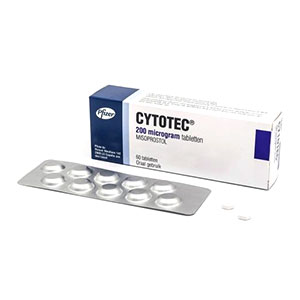The largest price comparison for medicines: the most popular pharmacies in comparison. Buy more than 200 medicines at low prices






Patent: Patent expired
Producer: Pfizer Pharma GmbH
Dosage: 200μg
Dosage form: tablet
Unit of measurement: μg
Active ingredient: misoprostol
Application areas:
Stomach ulcer, Duodenal ulcer, Abortion
Drug class: prostaglandin analogues
Onset of action: 30 minutes
Duration of action:
Available in: 0 Pharmacy(s)

Bioavailability: No
ATC-Code: A02BB01
Protein binding: ≥ 80%
Metabolism: Liver
Metabolites:
Half-life: 20-40 minutes
Excretion: Urine
CAS number: 59122-46-2
PubChem-CID: 5282381
Drug Bank: DB00929
ChemSpider: 4445541
UNII: 0E43V0BB57
KEGG: D00419
ChEMBL: ChEMBL606
ECHA-InfoCard: 100.190.521
Formula: C22H38O5
Molar mass: 382,54 g·mol−1
Cytotec is a potent synthetic drug used primarily to treat ulcers. This chemical analog of prostaglandin has cytoprotective effects associated with increased mucus formation in the stomach and increased secretion of bicarbonate by the gastric mucosa. It affects the parietal cells of the stomach, which inhibits acid production. When taken properly, it can also reduce meal-stimulated secretions.
Take Cytotec exactly as prescribed by your doctor. One tablet should be taken by mouth during the meal. The dosage depends on your health condition.
For the treatment of acute gastric and duodenal ulcers, 2 tablets of 200μg twice a day are usually prescribed. Alternatively, one Cytotec tablet of 200μg four times a day can be taken at regular intervals with food. Treatment usually lasts 4 weeks but can be extended up to 8 weeks.
To prevent and treat gastric mucosal damage that is or can be caused by taking NSAID drugs, you should take one 200 μg tablet two, three or four times a day. Your doctor will adjust your dose according to your needs. The duration of intake should be identical to the duration of therapy of the mucosa-damaging drug.
Children and young people
Risk of low blood pressure
Caution in patients prone to diarrhea
Particular caution in patients with impaired renal function
Hypersensitivity to the ingredients
Pregnancy
Lactation
Contraindicated in women of childbearing age
Inflammatory bowel diseases
Not safe
Do not buy and use Cytotec as a treatment if you are pregnant or trying to conceive as taking this medication may result in miscarriage, premature birth or birth defects.
Alcohol consumption should be avoided
During treatment with Cytotec, you should limit your alcohol consumption as much as possible or, ideally, avoid it altogether.
Do not apply a double dose if you have forgotten the previous application, but continue as before.
If you take more than you should, tell your doctor. There could be side effects.
Symptoms may include abdominal pain, diarrhea, cramps, tiredness, convulsions, difficulty breathing, drowsiness, fever, drop in blood pressure, palpitations and slow heartbeat.
There is a risk of significant interactions. Therefore, medical supervision is recommended.
Diarrhea
Stomach pain
Vaginal bleeding
Fever
Tremble
The effect of the drug is influenced by the food.
Keep this medicine out of the sight and reach of children.
Store in the original package in order to protect from light and moisture.
Do not store above 30°C.
What is Cytotec for?


How many Cytotec tablets do I need to take?


What to do if Cytotec does not work?


Where to buy Cytotec pills?


In what strengths can you buy Cytotec pills?


Cytotec is a prescription stomach protector that contains the active ingredient misoprostol. It is used to treat acute gastric and duodenal ulcers. It is also used to prevent stomach and duodenal ulcers while you are taking drugs that damage the lining of the mucosa (e.g. aspirin, ibuprofen, naproxen), particularly if you are at risk of developing ulcers or have had a history of ulcers. Misoprostol helps reduce the risk of serious damage to the lining of the stomach, such as bleeding. This drug protects your stomach lining by reducing the amount of acid that comes in contact with it.
Cytotec pills are also used in combination with another drug (mifepristone) to terminate pregnancy.
It is produced in the form of tablets and is only suitable for adults over 18 years of age.
Since we are talking about an effective drug with extremely significant clinical effects, the drug requires special care.
It must not be used by patients with severe liver disease, inflammatory bowel disease, severe kidney failure and inflammation of the small intestine.
To reduce the risk of drug-related ulcers, do not take Cytotec pills if you are pregnant. This medicine can cause termination of pregnancy, premature birth or birth defects. It is also important to avoid pregnancy while taking and within a month of treatment. It has been reported that Cytotec can cause uterine rupture after the eighth week of pregnancy. The rupture of the uterus can result in severe bleeding, hysterectomy, and/or death of the mother or fetus. If you become pregnant while on Cytotec therapy, stop taking these tablets and contact your doctor immediately.
For some people, taking these pills may cause side effects such as diarrhea, abdominal cramps, and/or nausea. In most cases, these problems appear in the first few weeks of therapy and stop after about a week. You can minimize possible diarrhea by making sure you take Cytotec pills with meals. Because these side effects are usually mild to moderate and usually go away within a few days, most patients can continue to use Cytotec. If these problems last more than 8 days, or if you have severe diarrhea, cramps, and/or nausea, call your doctor.
The drug is not suitable for children and adolescents under 18 years of age.
Cytotec interacts with other drugs, vitamins and herbal medicines.
With simultaneous use with antacids, the concentration of misoprostol in the blood plasma decreases. If used concomitantly with antacids containing magnesium, diarrhea may increase. When administered simultaneously with acenocoumarol, the effect of acenocoumarol is reduced. Due to the simultaneous intake with diclofenac or indomethacin, the side effects of diclofenac and indomethacin are increased.
To minimize the dangerous effects, make sure your doctor is aware of all medicines you are taking or plan to take during the treatment cycle.
Like all medicines, Cytotec can cause side effects, although not everyone gets them. Talk to your doctor about possible side effects.
Stop taking these tablets and contact your doctor if you have any of the following symptoms that could indicate an allergic reaction:
If you notice any of the following symptoms, tell your doctor right away:
Rashes and diarrhea are very common side effects with Cytotec pills, affecting more than 1 in 10 people.
Common side effects include:
Occasionally fever, irregular menstrual cycle, period problems, severe uterine pain and vaginal bleeding occur.
Rare side effects are:

Subscribe to our newsletter and get the latest updates and special offers!
Leave a comment
Thank you for sharing your experience!
Your experiences will be published soon!